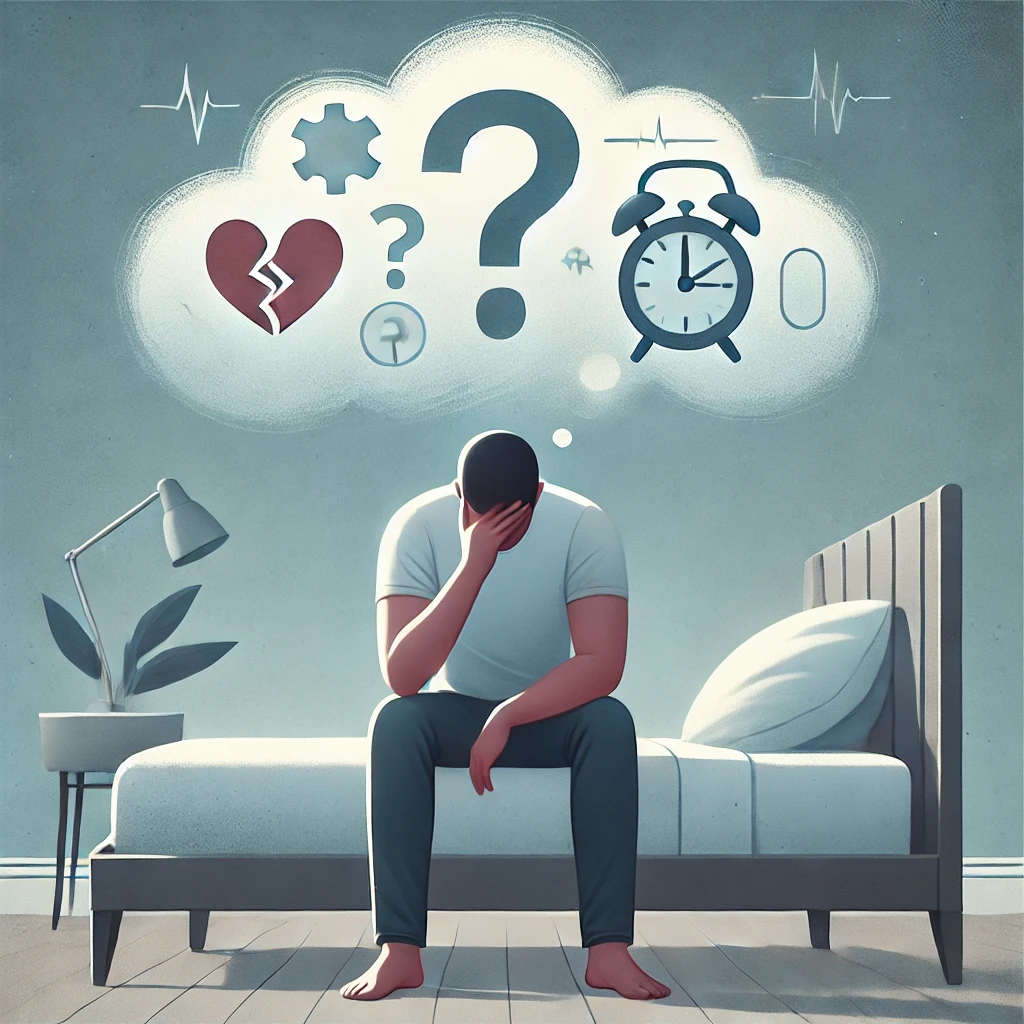When the Problem Isn’t Physical
Erectile dysfunction (ED) is often linked to physical health problems — like poor blood flow or low testosterone — but for many men, especially those under 40, the root cause is psychological. One of the most common mental blocks is performance anxiety, a condition where the fear of not performing sexually actually prevents the body from doing so.
Performance anxiety can strike anyone — even men with no physical health issues — and the effects can be frustrating, confusing, and emotionally draining. The good news is that it’s both understandable and treatable.
What Is Performance Anxiety?
Performance anxiety is a type of sexual dysfunction rooted in psychological stress, where the fear of failure interferes with arousal or erection. It creates a vicious cycle: you worry about performing well, and that stress actually disrupts the mental and physical processes required for sexual function.
Common symptoms:
- Difficulty getting or maintaining an erection during sex
- Erections are fine during masturbation but not with a partner
- Racing thoughts during intimacy
- Physical symptoms like sweating, shallow breathing, or a racing heart
- Avoiding sex altogether due to fear of failure
What Causes Sexual Performance Anxiety?
1. Fear of Disappointment
Worrying about pleasing your partner or living up to expectations can create extreme pressure, especially in new relationships.
2. Previous Negative Experience
A single episode of ED — even if caused by fatigue or stress — can trigger anticipatory anxiety in future encounters.
3. Low Self-Esteem or Body Image Issues
Doubts about your body, size, or attractiveness can become mental distractions that pull you out of the moment.
4. Comparisons With Porn or Past Partners
Unrealistic standards set by adult content or past relationship memories can make you feel inadequate.
5. Relationship Tension
Emotional distance, unresolved conflicts, or lack of communication with a partner can manifest as physical tension during intimacy.
6. Depression or Generalized Anxiety
Underlying mental health conditions often lower libido and affect arousal, even if they’re not directly related to sex.
How Anxiety Affects Erections
The erection process is largely controlled by the parasympathetic nervous system, which governs relaxation and arousal. But when anxiety kicks in, your sympathetic nervous system (fight or flight) takes over. This floods the body with adrenaline, increases cortisol, and redirects blood flow away from the genitals — making it difficult, or impossible, to get or maintain an erection.
Simply put: the body can’t be anxious and aroused at the same time.
Breaking the Cycle of Performance Anxiety
Overcoming performance anxiety takes patience, self-awareness, and consistent effort. Here are the most effective ways to regain control:
1. Acknowledge It Without Shame
The first step is to stop pretending it’s only physical. Accepting that anxiety is part of the issue reduces its power. Many men go through this — you’re not alone or broken.
2. Practice Mindfulness During Sex
Train yourself to stay in the moment:
- Focus on physical sensations, not outcomes
- Breathe deeply and slowly to stay grounded
- Avoid “spectatoring” — where you mentally watch and judge yourself
3. Talk Openly With Your Partner
Hiding your struggle increases the pressure. A supportive conversation can:
- Reduce tension between you
- Build trust and emotional intimacy
- Ease your fear of judgment or rejection
Even a simple sentence like:
“Sometimes I overthink things during sex, and it makes it harder for me to stay relaxed — it’s not about you.”
can relieve pressure instantly.
4. Explore Non-Penetrative Intimacy
Remove the focus from intercourse and explore other forms of connection:
- Massages
- Oral sex
- Mutual touching
- Intimate kissing and cuddling
This helps rebuild confidence and proves to your brain that sex doesn’t have to be a performance.
5. Limit Alcohol and Porn
Both can interfere with natural arousal and increase anxiety. Porn often sets unrealistic expectations, while alcohol reduces nerve sensitivity and blood flow — increasing the likelihood of ED.
Try a detox from both for 2–3 weeks and observe the difference in your sexual responses.
6. Practice Relaxation Techniques
To train your nervous system to stay calm during intimacy:
- Meditate daily for 10 minutes
- Use deep breathing exercises before sex
- Visualize a positive, calm experience
These practices help your body respond differently to stressful moments.
7. Get Regular Exercise
Physical activity helps reduce anxiety, improve blood flow, and boost testosterone — all essential for healthy sexual function.
Aim for:
- Cardio (30–45 mins, 3–5 times a week)
- Strength training (to support hormone levels)
- Stretching or yoga (to release tension)
When to Seek Professional Help
If performance anxiety persists and continues to interfere with your relationships or mental health, therapy is a powerful tool. Talking to a licensed therapist or sex therapist can help you uncover:
- Core beliefs behind your fears
- Unresolved emotional wounds
- Relationship dynamics that increase pressure
Cognitive Behavioral Therapy (CBT) is especially effective in treating performance-related ED.
Medication: A Short-Term Option
Some men benefit from using ED medications (like sildenafil or tadalafil) temporarily, to break the cycle of failure and anxiety. These are not permanent solutions, but when used in combination with therapy or self-work, they can rebuild confidence.
Always consult a doctor before starting any medication.
Regaining Control and Confidence
Performance anxiety is real — but it’s not permanent. By addressing the psychological roots of ED, building healthy intimacy with your partner, and practicing calm awareness, you can restore not only your sexual function but also your sense of self-worth.
You deserve a sex life that’s free of pressure, full of connection, and guided by pleasure instead of fear. Start slow, be kind to yourself, and trust the process.
